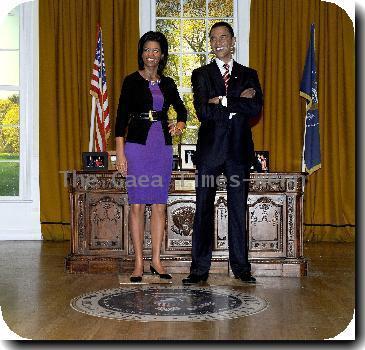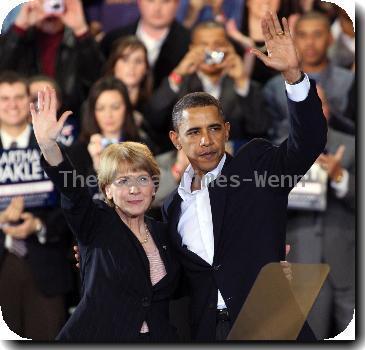US-Cuba talks taking place under a cloud of mutual mistrust, dashed hopes and harsh words
By Paul Haven, APThursday, February 18, 2010
US-Cuba immigration talks under cloud of mistrust
HAVANA — The last time U.S. diplomats traveled to Havana, they held secret talks with their Cuban counterparts that were hailed as the most significant in decades. Almost nothing has gone right for U.S.-Cuba relations in the five long months since.
When State Department officials sit down with Cuban leaders for immigration talks Friday, the encounter will take place under a cloud of mutual mistrust and dashed hopes. Last year’s hopes that the election of President Barack Obama could mean quicker progress toward ending a half-century of U.S-Cuban enmity now seem a pipe dream.
“Expectations on both sides were perhaps too high, and as a result I think there is a lot of disappointment,” said Robert Pastor, a longtime foreign policy adviser on hemispheric affairs and professor at American University.
The delegation will be led by Craig Kelly, deputy assistant secretary of state for Western Hemisphere affairs and the most senior U.S. official to travel to Cuba in years. One of Kelly’s subordinates, Bisa Williams, came in September for separate talks aimed at re-establishing direct mail service.
A State Department spokesman told The Associated Press that Kelly could venture beyond the meeting’s focus and into stickier subjects.
“Other matters of mutual concern may arise in our meetings,” Charles Luoma-Overstreet said.
That surely includes the fate of Alan P. Gross, a 60-year-old U.S. government contractor from Potomac, Maryland, arrested in Cuba on Dec. 3. Gross — a longtime international development worker who Cuba contends is a spy — has been held at Havana’s high-security Villa Marista jail without charge for allegedly supplying communication equipment to members of Cuba’s tiny Jewish community.
“This is a matter we have raised on multiple occasions with the Cuban government and that we will continue to raise with them,” said Luoma-Overstreet. “We believe he should be released and permitted to return to his family.”
Ending weeks of silence, Gross’s wife put out an Internet video Thursday pleading for his release.
“Alan has done nothing wrong and we need him home,” a somber looking Judy Gross said. “Alan is a humanitarian. He loves other cultures. … In Cuba, he was helping the Jewish community improve communications and Internet access.”
She expressed hope that this week’s talks will help lead to her husband’s release.
“We’re hoping that the U.S. officials and the Cuban officials can get together and mutually agree on a way to bring him home,” she said.
She said she had been allowed three brief phone conversations with her husband, and he had been visited twice by U.S. consular officials.
Pastor said the timing of Gross’ arrest has been particularly chilling for relations.
“In the eyes of some in the United States, the question is, ‘Why did the Cubans arrest him now?’” he said. “The Cubans apparently knew of his work and the program for many years, so the fact they arrested him at this moment has led some in the government to ask what message they are trying to send.”
Things seemed far more positive last September, when Williams stayed on in Cuba after the mail talks for unannounced meetings with senior officials and toured a government agricultural facility.
A Cuban official told AP at the time that she also attended a rock concert that drew hundreds of thousands to the iconic Revolution Plaza, beneath a giant likeness of revolutionary hero Ernesto “Che” Guevara.
The visit raised hopes of a new beginning for relations under Obama, who has said he wanted to extend a hand of friendship — but it has been all downhill since then.
In November, the State Department expressed concern after reputed Cuban security officials briefly detained a well-known blogger, Yoani Sanchez. Obama later personally responded to a series of questions that Sanchez posted on her Web site, raising her profile and angering Cuban officials.
Havana held military exercises soon after that a senior army official said were designed to counter a possible U.S. attack.
More recently, Cuban leaders have been highly critical of Obama’s performance at climate talks in Copenhagen, suspicious of U.S. policy in Latin America, and downright apoplectic about Cuba’s inclusion on a list of alleged state sponsors of terrorism.
In December, Fidel Castro wrote in an essay that Obama’s “friendly smile and African-American face” are masking Washington’s sinister designs on Latin America. Cuba’s foreign minister called the U.S. president an “imperial and arrogant” liar.
Castro even criticized U.S. relief efforts in quake-devastated Haiti, accusing Washington of sending troops to “occupy Haitian territory.”
The immigration talks resumed last July after a six-year hiatus. Held twice annually, their aim is to monitor adherence to a 16-year-old agreement under which the United States issues 20,000 emigration visas to Cubans per year.
The accord seeks to avoid a repeat of the rafters crisis of 1994, when Cuba briefly opened its borders and tens of thousands tried to make it to American soil in nearly anything that would float.
Wayne Smith, a senior fellow at the Center for International Policy and former head of the U.S. Interests Section in Havana, said the Obama White House has fallen into the same pattern as past administrations, failing to take bold steps to improve relations. And Havana hasn’t made it any easier.
“What can you really expect from these talks?” he said. “It is good they are being held, and maybe some constructive steps will come of it. But it is relatively limited.”
Tags: Barack Obama, Caribbean, Cuba, Foreign Policy, Geography, Havana, Latin America And Caribbean, North America, United States




